Martin Luther King Jr said that the arc of the moral universe was long but that it bent towards justice. Though many may feel that the election of Donald Trump is a force in opposition to that bending; as Christians we are called to see its essential truth and to work toward its implementation. In 2016, the work of the church to continue Jesus’ earthly ministry continued with the difficulties and travails as well as with the joys and triumphs inherent in all human activities.
The themes and events of 2016 in the life of the Episcopal Church, for the most part, were the continuation of themes in the immediate past. The church is in the midst of changes, largely driven by larger cultural forces that will most likely result in a very different way of being in the future. But what exactly that new way is or will look like, isn’t clear and probably won’t be for some years yet. The future isn’t something whose unveiling we await, but a reality that we are building one choice or decision at a time today.
The leadership of Presiding Bishop Michael Curry; our relationships in the Anglican Communion; the struggle to widen the circle of inclusion, the future of the church, especially theological education, and the election of Donald Trump all generated multiple stories on the Café this year. So, here is a view of the year that was; a review of the choices and decisions that are forming our future together.
Presiding Bishop Michael Curry
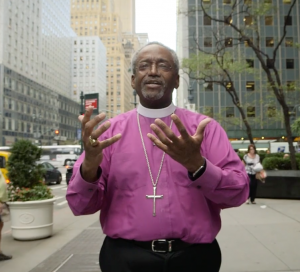 Michael Curry, Presiding Bishop of the Episcopal Church continues to make his mark and seems intent on changing the tenor as well as the trajectory of the Episcopal Church in American life. At the end of last year Curry made an announcement that three high-ranking staffers at the Church Center, including COO Stacy Sauls would be put on administrative leave pending an investigation into unspecified misconduct contrary to church policies. In April, the results of the investigations were announced and they painted a picture of an unhealthy workplace driven by mistrust and lack of accountability. All three staffers subsequently found themselves out of a job and Curry has pledged a complete rebuilding of the Church Center staff to more fully reflect our aspirations as the body of Christ.
Michael Curry, Presiding Bishop of the Episcopal Church continues to make his mark and seems intent on changing the tenor as well as the trajectory of the Episcopal Church in American life. At the end of last year Curry made an announcement that three high-ranking staffers at the Church Center, including COO Stacy Sauls would be put on administrative leave pending an investigation into unspecified misconduct contrary to church policies. In April, the results of the investigations were announced and they painted a picture of an unhealthy workplace driven by mistrust and lack of accountability. All three staffers subsequently found themselves out of a job and Curry has pledged a complete rebuilding of the Church Center staff to more fully reflect our aspirations as the body of Christ.
Bishop Curry also took prominent stances in support of issues of social justice, most notably perhaps by his support and presence near the Standing Rock reservation where he joined the self-styled “water protectors” standing in opposition to an oil pipeline that threatened their water supplies and sacred land. The Episcopal Church also formally stated its opposition to the Dakota Access Pipeline by resolution of the Executive Council. The #NoDAPL movement, like #BlackLivesMatter has called to account the increasing militarization of American police forces and the systemic oppression and marginalization of communities of color.
And in a move that should surprise no one, given Bishop Curry’s exuberant proclamation of the gospel, the Presiding Bishop’s Office for Evangelism Initiatives announced that six events, termed Revivals, would be held over the next two years. Initial reaction this initiative has not been predominantly positive, at least according to comments here at the Café and on our Facebook page, but it will be interesting to see how these events are packaged and in what ways they affect the perception of the church in the wider culture as well as their impact on Church engagement and membership.
The US elections and the rise of Trump
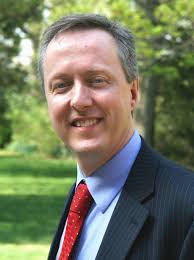
2016 was an election year here in the United States, and in a faith tradition that upholds the value of civic engagement, its repercussions were keenly felt throughout the church. Back in March, Dean and President of Virginia Theological Seminary, Ian Markham penned an editorial that was widely read and which seemed controversial at the time decrying the rise of Donald Trump.
In it he wrote;
“Trump is pure rhetoric; and Republicans like the tone. They don’t want a realpolitik to shape foreign policy, they hanker for an age when “America just bombs its enemies out of existence”. Trump promises a great America; one where people are all speaking English “again”. The lack of clarity around policy implementation is fine: the tone is what they love.
But there is more going on. There is a revolt against ‘political correctness’. Let me be clear: when attacking political correctness is an excuse to flirt with David Duke, attack Latinos and Muslims, and denigrate women, then that is wrong…
For Trump, being “anti-political correctness” is code for the freedom to be ugly. “Muslims should be banned from America”; “Latinos should be sent home”. “This reporter has a disability”. “She is a slut”. This is the language of Trump. Trump is providing license for people to utter what was beyond the bounds of civility.”
He also called on the Episcopal Church to be at the forefront of maintenance of the “commons” of American political and cultural life;
“What is needed is for commentators who are responsible for protecting the Public Square from the language of oppression to be a little less understanding with the anger that Americans are feeling… The Episcopal Church should start saying, loud and clearly, “stop this tantrum and grow up America.”
Trump’s ascendance has inspired white nationalists and anti-Semites, among others, to be more overt and aggressive in spewing their narrow-minded and hateful bigotry. The ugliness unleashed by the rise of Trump has resulted not only in ugly words but also in ugly actions such as the arson of a predominantly African-American church in Greenville, Mississippi that was also spray painted with the words “vote Trump.” Though clearly not everyone who supported Trump is bigoted; Trump’s appeals to racism, xenophobia and misogyny were overt enough that many progressives found themselves questioning the commitment of his supporters to basic decency and the dignity of all people.
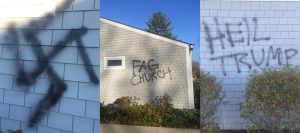
Because of the church’s prominent support of social justice issues, some Episcopal churches have been targets of hate crimes. Two Episcopal congregations were also vandalized and defaced; one in Indiana and one in Maryland. However, given that the Episcopal church is overwhelmingly white it is likely that many Trump supporters can be counted among its members. A significant challenge for the church will surely be learning to stand for the Christian imperatives of justice, mercy, and inclusion without further division stemming from partisan political loyalties if we are to stand by our motto “all are welcome.”
Marriage Equality and LGBT+ inclusion
Marriage equality continued to be a prominent theme in 2016. The season of Advent at the end of 2015 ushered in marriage equality across most of the church after the decisions of the previous summer’s General Convention to amend the marriage canon and provide rites for marriage without reference to the sex of the couple. Though the Episcopal Church has clearly discerned its path (despite some dioceses’ continuing resistance), many other church bodies are still in the midst of discerning the role of LGBT+ persons in the life of their churches. The United Methodist Church came to the brink of a definitive split over the issue at its General Conference in Portland in May. The UMC appears to be in sort of limbo for now, with no final decisions having been made but with parties for and against full inclusion moving to consolidate their positions.
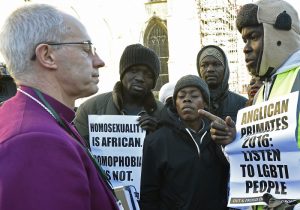
The issue of LGBT+ inclusion has also been playing itself out across the Anglican Communion with important steps forward in Scotland and Canada, where synods passed the first of two votes needed for marriage equality. The Anglican church of Aotearoa, New Zealand and Polynesia, however, voted to table any votes for at least two years and is hoping for further dialog until then to find a way to hold together while honoring the integrity of all parties.
Marriage equality and full inclusion have made halting progress in the Church of England as well, where a poll at the beginning of the year finds growing support for marriage equality, with more now in favor than are opposed. A process of shared conversations around the topic concluded in July, but no formal resolutions or votes have been brought to General Synod. It seems clear, that the issue of full inclusion of LGBT+ members of the CoE will eventually come to a head, and soon, despite the efforts of the Archbishops of York and Canterbury to put off any such effort in favor of unity.
Anglican Communion Relations
In response, schismatic groups sponsored by African bishops have been forming similar to what was seen in the US and Canada. GAFCON has also been making (inept) efforts to silence supporters of inclusion. GAFCON has also begun speaking openly of an Anglican communion without the Church of England and have continued their efforts to sideline the Episcopal Church, though with little effect. As we said in our editorial at the time of the Primate’s Meeting in January; our continued commitment to our Anglican brothers and sisters remains of vital importance; “In those GAFCON churches are brothers and sisters in Christ who look to our example as a sign of hope and who need our continued support and advocacy and vision of an inclusive Anglicanism.”
Theological Education
Theological education also was prominent in the news this year. Andover-Newton, the oldest independent Protestant seminary in America decided to close its campus and enter into an agreement to continue as part of the Yale Divinity School. And two Pennsylvania seminaries of the Evangelical Lutheran Church in America (ELCA) opted to merge as well. In the world of Episcopal seminaries, Episcopal Divinity School decided to end all its degree programs but without announcing what its mission, if any, would be in the future. In November, the Board announced they were seeking affiliation with other institutions to continue their “historic mission,” but in what form is unknown. Bexley Seabury also underwent significant changes by leaving its home since 1999 as a partner of Trinity Lutheran Seminary in Columbus, OH to relocate to Chicago in partnership with Chicago Theological Seminary.
How the leadership of the church is formed remains a vital issue. Though many decry that clergy are often ill-served for leadership in the church by their seminary educations; perhaps the issue is that priests are being asked to serve in ways outside of their callings. Do we really want them to be CEO’s of non-profits?
And 2017?
The key theme for 2017 will be the spreading conflict between authoritarianism and individual 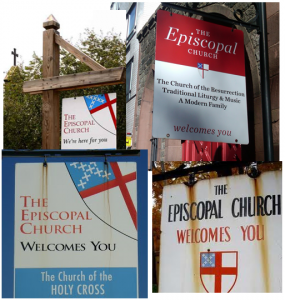 liberty. This is true in American domestic politics and in politics across the globe, both secular and ecclesiastic. Conflicts between the hopes and values of a majority of Americans and the incoming government seem poised to deeply affect how the Episcopal Church approaches mission and ministry in many ways. Our relationships with the Anglican Communion are affected by the same conflict but we are unlikely to see any formal changes in 2017. The party of centralization of power and authority, led by GAFCON, seem unlikely to make any formal moves to realign the communion before the next Lambeth Conference in 2020, though a possible acceptance of marriage equality in the CoE before then would surely shift that.
liberty. This is true in American domestic politics and in politics across the globe, both secular and ecclesiastic. Conflicts between the hopes and values of a majority of Americans and the incoming government seem poised to deeply affect how the Episcopal Church approaches mission and ministry in many ways. Our relationships with the Anglican Communion are affected by the same conflict but we are unlikely to see any formal changes in 2017. The party of centralization of power and authority, led by GAFCON, seem unlikely to make any formal moves to realign the communion before the next Lambeth Conference in 2020, though a possible acceptance of marriage equality in the CoE before then would surely shift that.
Ultimately, we are faced with a conflict between hope and fear, and right now it feels like fear has the upper hand. Our cultural desire for safety has led us towards darkness and that darkness is spreading. The future of our Church and our civic societies will hinge on our willingness to step out in faith and risk our safety for the sake of the Gospel promise.
As Dietrich Bonhoeffer said;
“There is no way to peace along the way of safety. For peace must be dared, it is itself the great venture and can never be safe. Peace is the opposite of security. To demand guarantees is to want to protect oneself. Peace means giving oneself completely to God’s commandment, wanting no security, but in faith and obedience laying the destiny of the nations in the hand of Almighty God, not trying to direct it for selfish purposes. Battles are won, not with weapons, but with God. They are won when the way leads to the cross.”

